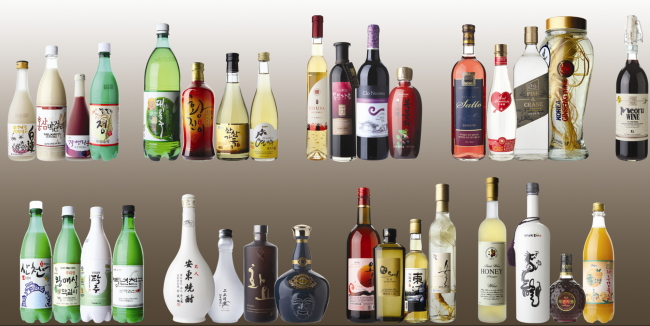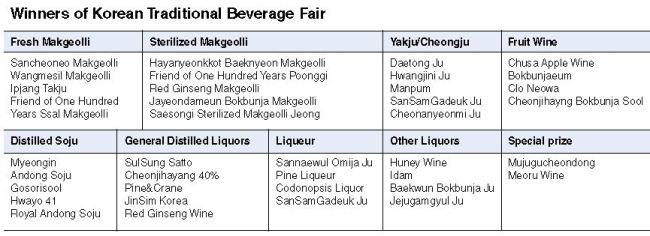Korean traditional alcoholic beverages go global
2012-12-27 19:26
More and more foreign buyers are focusing on Korean traditional alcoholic beverages as Makgeolli, a rice-based alcohol product, has been gaining growing popularity in the overseas market.Amid the movement to revitalize the traditional alcoholic beverage market, more than 240 brands nationwide participated in the Korean Traditional Beverage Fair last October.
The annual contest is aimed at elevating the quality of Korean alcoholic beverages by promoting taste competitions of representative brands in provinces and cities across the country.
Major segments include makgeolli, sterilized makgeolli, distilled soju, general distilled liquor, yakju herbal liquor, cheongju rice wine, fruit wine and liquor.
In the 2012 contest, hosted by the Korean Traditional Alcoholic Beverage Development Association in coordination with the Agriculture Ministry and the Korea Agro-Fisheries & Food Trade Corp., 32 brands were awarded in the eight major segments.
Myeongin Andong Soju enjoyed the top prize for the distilled soju sector for the third consecutive year.


Myeongin Andong Soju features a special filtering method and long-term aging, which provides consumers with soft drinking. The product is known as a distilled spirit brewed with traditional methods, sowing highest quality rice grown in fertile soil pure fresh water.
The artisans of Andong soju are Joe Ok-wha and Park Jae-seo. These artisans keep alive the traditional ways of making Andong soju through the Korean government’s support for discovering traditional alcoholic beverages since the 1986 Asian Games and 1988 Summer Olympics.
The brand is perhaps the most famous of all Korean traditional sojus. Made in the aristocratic town of Andong, it is said to have originated in either the Silla or Goryeo era. It was traditionally used to relieve stomach pains and ills.
Currently, there are many brands that include the name Andong Soju but there is only one that is an intangible cultural asset, which is simply called Andong Soju without any other name attached. The liquor is so famous it has its own museum and plays an important part in the annual Andong Folklore Festival.
Gosorisool, a brand from Jeju Island, also drew wide interest during the contest as a winner for the distilled soju sector.
Gosorisool is usually made by distilling the fermented Omegisool and may be kept for quite a long time.
Gosorisool is one of the few notable products in Jeju-do, with the tradition almost dying out during the Japanese occupation. Fortunately, the brand’s traditional method was revived in the folk village of Sungeup, Jeju, and has obtained intangible cultural asset status.
Among other prize-winners were Cheonjihayng Bokbunja Sool, SulSung Satto, JinSim Korea Red Ginseng Wine, Pine Liqueur, Daetong-ju, SanSamGaDeuk Ju, Pine & Crane, Clo Neowa and Hwayo 41.
As Italian and French wines differ from region to region, Korea also has a wide range of distinctive alcoholic drinks by region.
Not only do many have their own particular brand of soju but also their own particular traditional drink or folk drink. Alcoholic beverages are generally called “sool” and Korea’s sool culture has a very long history.
The traditional drinks are made by various brewing methods from cereals, fruit, herbs and plants.
As sool is meant to be drunk with accompanying food called “anju,” there are also special anju dishes which are presented with sool on a “juansang,” which also differs according to place.
By Kim Dong-hoon
The author is director of the Korean Traditional Alcoholic Beverage Development Association. ― Ed.


